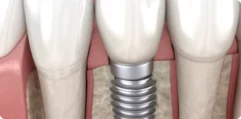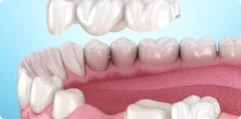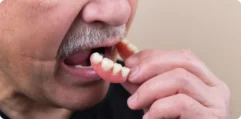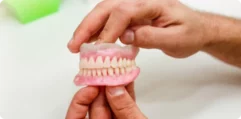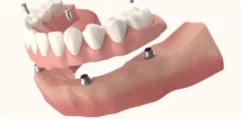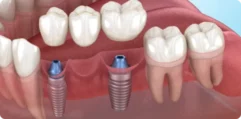Missing Teeth Before And After
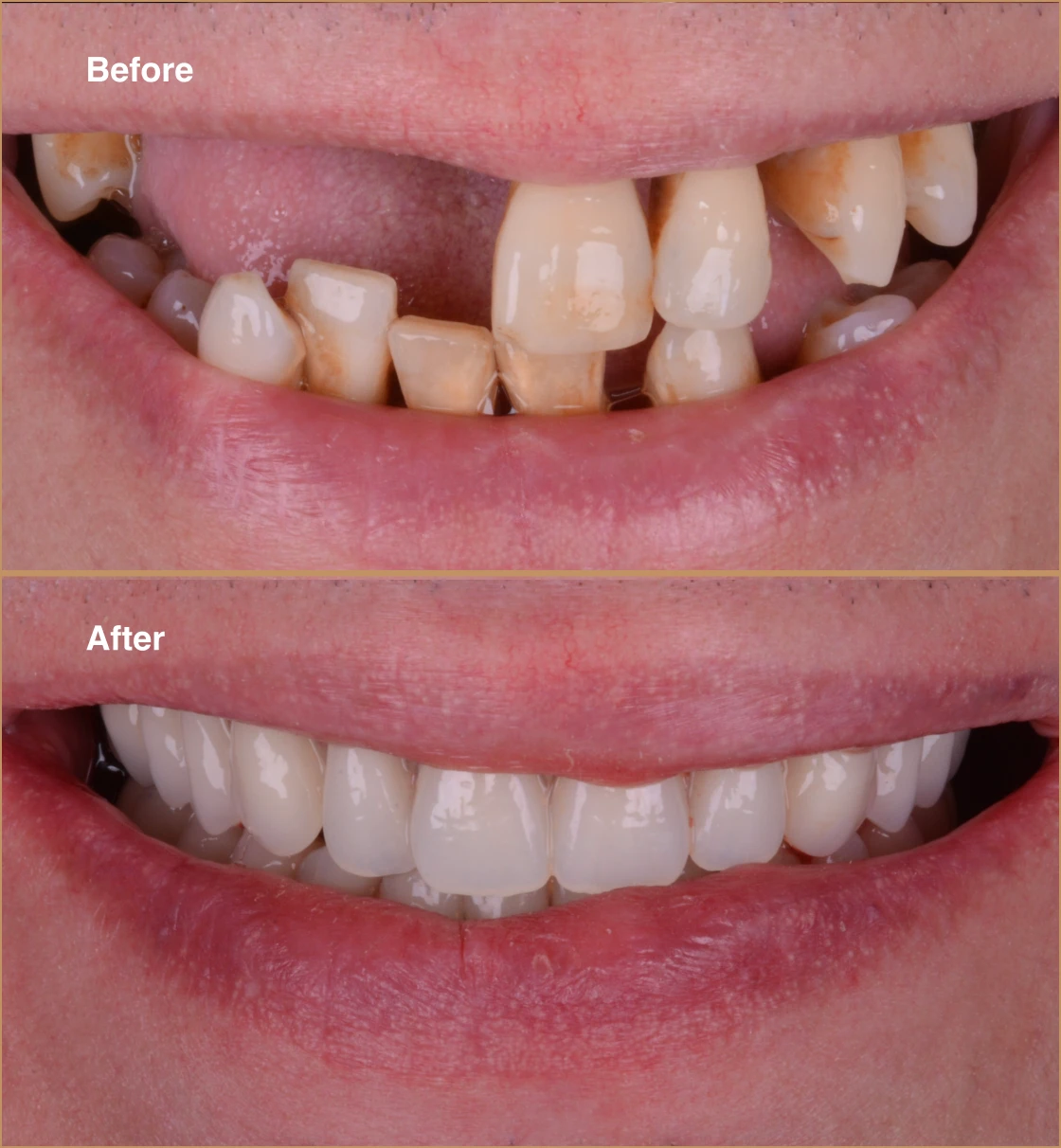
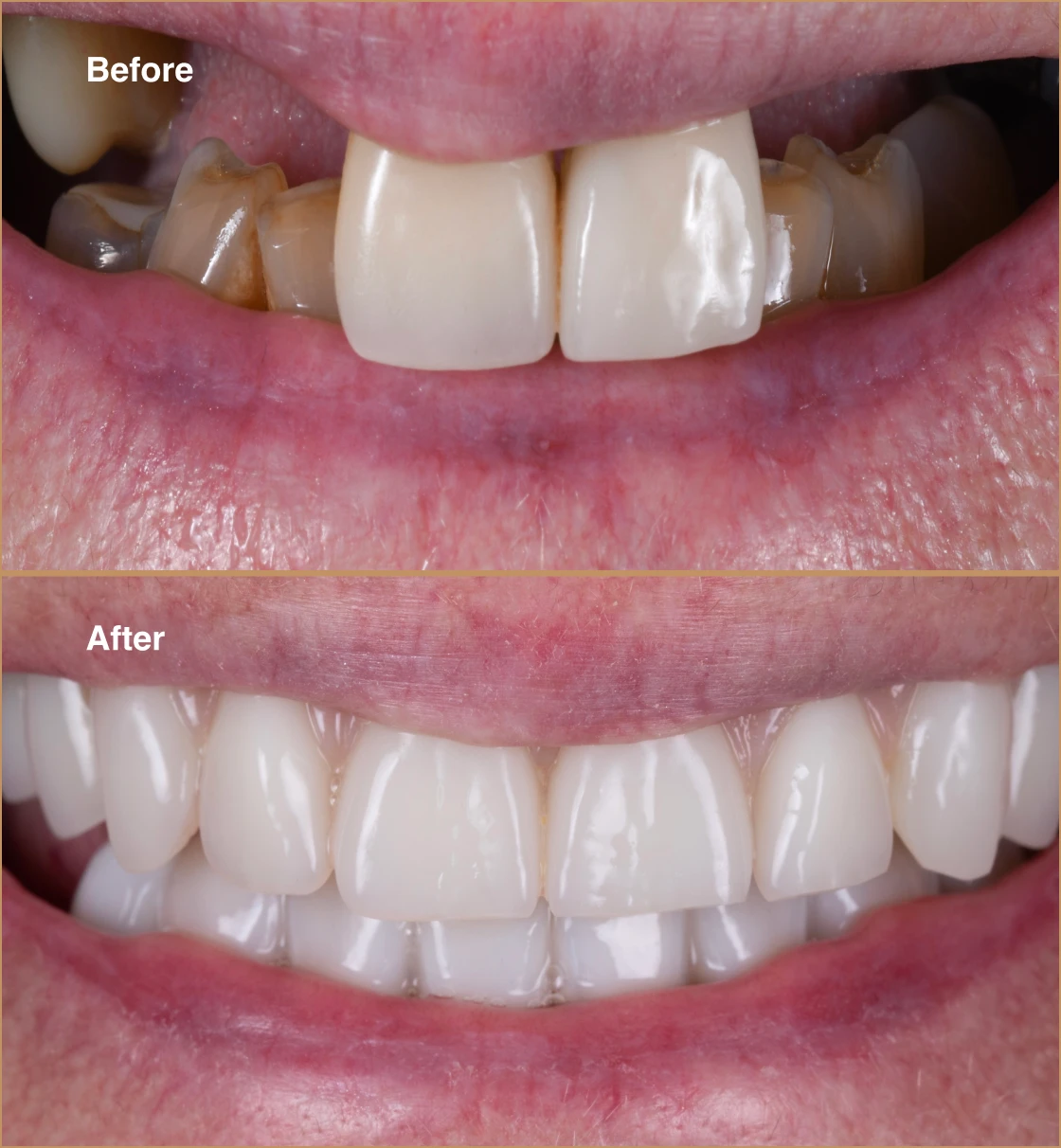
Problems With Missing Teeth
- Difficulty Chewing: Missing teeth can make it challenging to chew food properly, potentially leading to digestive issues and nutritional deficiencies.
- Speech Impairments: Gaps in the mouth can affect speech, causing pronunciation problems and making it difficult to communicate clearly.
- Self-Esteem Issues: - Many patients experience a loss of confidence and self-esteem due to the visible gaps in their smile, which can impact their social interactions and overall well-being.
- Oral Health Complications: Missing teeth can result in adjacent teeth shifting and becoming misaligned, leading to bite problems and an increased risk of gum disease and tooth decay.
- Jawbone Loss: Over time, the jawbone may start to deteriorate in areas where teeth are missing, potentially affecting facial structure and causing further dental issues.
- Limited Food Choices: Missing teeth can restrict the types of food a person can comfortably eat, potentially leading to a less varied and less nutritious diet.
- Social and Professional Impact: The self-consciousness stemming from a compromised smile can affect a person's social life and professional opportunities.
Options For Missing Teeth
Concerns You May Have Around Missing Teeth
- Cost: Dental treatments to replace missing teeth can be expensive, and not all patients have the financial means to cover the expenses, especially if they are not covered by dental insurance.
Solution: Dental implant treatment can be spread over a number of months due to the staging of the treatment. We also provide 0% finance up to 18 months
- Lack of Insurance: Many dental insurance plans do not provide sufficient coverage for advanced tooth replacement options, leaving patients with limited financial support.
Solution: Dental implant treatment can be spread over a number of months due to the staging of the treatment. We also provide 0% finance up to 18 months
- Fear of Dentistry: Dental anxiety or phobia can deter patients from seeking treatment, especially if they anticipate pain or discomfort during dental procedures.
Solution: Dental implant treatment is not painful at all due to the use of dental anaesthetic that is provided. It no more discomfort than having a tooth removed
- Misinformation: Lack of awareness or misconceptions about the importance of replacing missing teeth and the available treatment options can prevent patients from seeking care.
Solution: Have a look at our dental implant page to provide you with more information around dental implants
- Time Constraints: Some patients may delay or avoid treatment due to busy schedules and the time required for dental appointments and recovery.
Solution: We provide flexible appointment scheduling, weekend and evening appointments to work around your busy lifestyle
- Perceived Lack of Necessity: Patients may underestimate the long-term consequences of missing teeth and believe that they can adapt to the situation without addressing it.
Solution: Missing teeth over the long term can cause bone loss, which can make it harder to place implants in the future, in addition, other teeth can drift in to the missing teeth space
- Inconvenience: The thought of multiple dental appointments, procedures, and potential adjustments can discourage some patients from pursuing treatment.
Solution: Whilst several appointments may be required to complete the treatment quite often they are spaced out over a several month period. Once the implant is in and integrated the appointments required are to take a record of the position of the implant to send to the lab, and then the connection of the tooth to the implant
- Age and Health Conditions: Older patients or those with certain medical conditions may feel that dental treatments are not suitable or are too risky for them.
Solution: Whilst some health conditions will not allow for dental implants, most medical conditions can be managed around the dental implant treatment, there are very few reasons and justifications for implants not being able to be placed
- Stigma of Dental Appliances: Concerns about the social stigma associated with wearing dental appliances like dentures or partials can deter some patients from seeking these solutions.
Solution: Whilst the stigma of dental appliances can be a worry for some, the functional and aesthetic benefit of having a fixed set of teeth is much more beneficial
- Limited Access to Dental Care: In some areas, access to dental care may be limited, making it difficult for patients to find suitable options for replacing missing teeth.
Solution: Whilst access to dental care can be a problem for some, our clinics are located in city centre locations with ample parking available
Missing Teeth Before and After
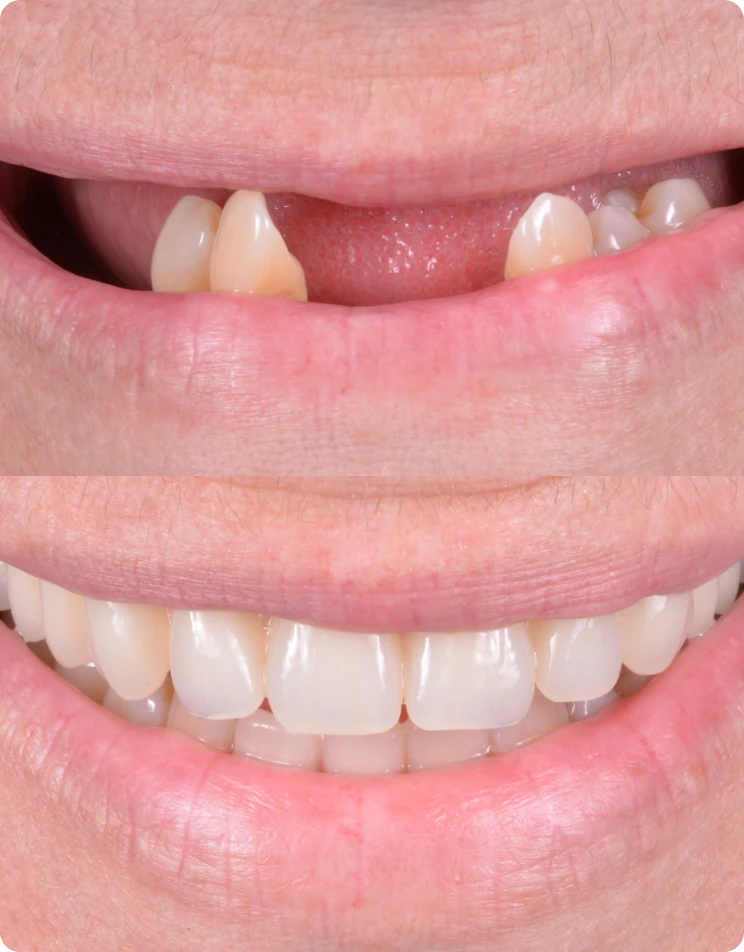
All On Four Dental Implants
This patient had multiple upper missing teeth replace with all on four dental implants. This procedure also know as smile in a day is completed with the placement of four dental implants placed in the upper jaw. They are then connected to a full set of fixed teeth
Implant Supported denture
This patient had their old denture replaced with a brand new one which was connected to a set of dental implants
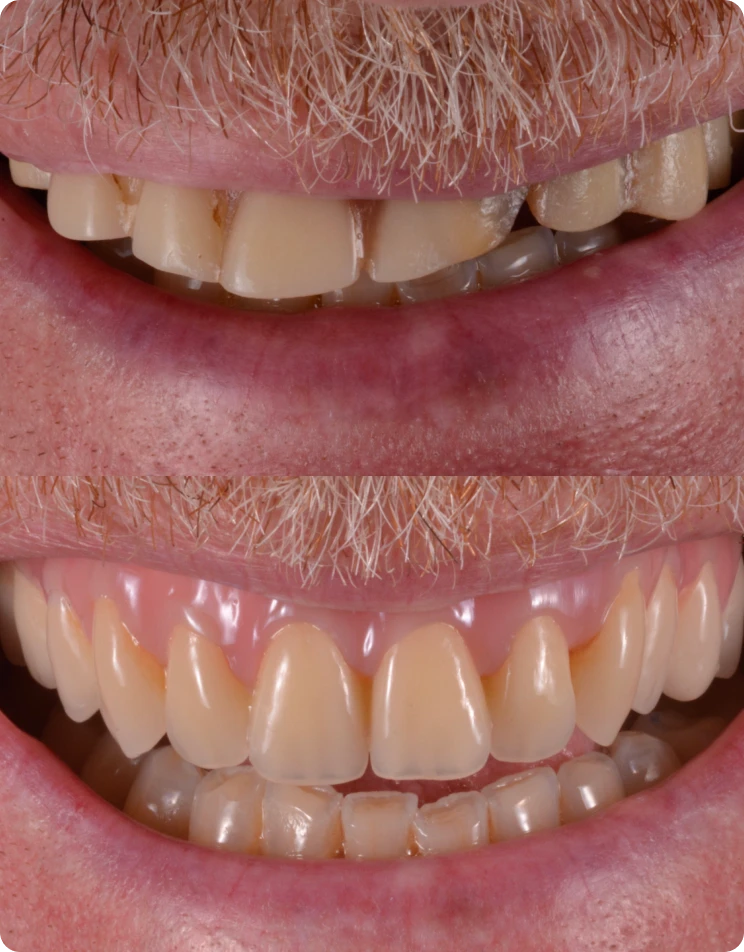
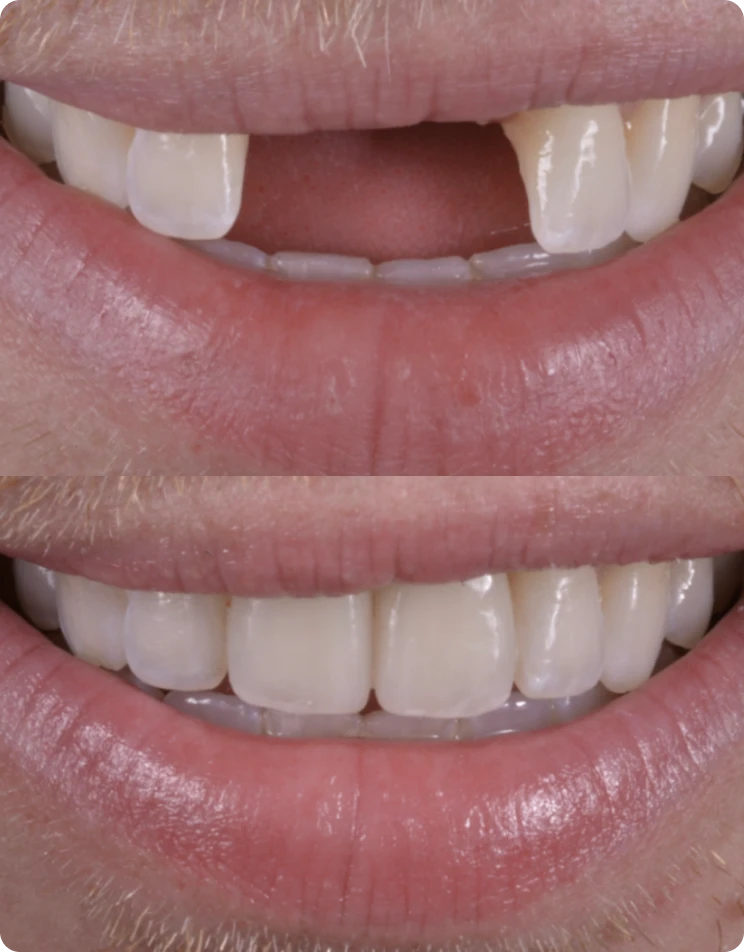
Multiple Dental Implants
This patient had their front two teeth replaced with dental implants to enhance their smile
Missing Teeth FAQ
What are missing teeth, and why should I be concerned about them?
Missing teeth are teeth that are no longer in your mouth. It’s important to address missing teeth because they can affect your ability to eat, speak, and smile comfortably. They can also lead to oral health issues if left untreated.
What are dental implants, and how do they help replace missing teeth?
Dental implants are like artificial tooth roots. They are placed in your jawbone and serve as anchors for to replace teeth. Dental implants are a long-lasting and natural-looking way to replace missing teeth.
What are dental bridges, and how do they work for replacing missing teeth?
Dental bridges are teeth that bridge the gap left by missing teeth. They are attached to adjacent natural teeth or dental implants. Bridges can be a good option if you have one or more missing teeth in a row.
What are dentures, and how do they help with missing teeth?
Dentures are removable appliances that replace missing teeth. They can be full dentures (replacing all teeth) or partial dentures (replacing a few teeth). Dentures are a more affordable option for replacing missing teeth.
How do I know which option is right for me – dental implants, dental bridges, or dentures?
Your dentist will help you decide based on your specific needs and oral health. Dental implants are the most durable but may require surgery. Bridges and dentures are good alternatives, and your dentist will discuss which is best for you.
Is it important to replace missing teeth, even if they don't cause immediate problems?
Yes, it’s essential to replace missing teeth because they can lead to oral health issues over time. Adjacent teeth may shift, making it harder to clean and increasing the risk of tooth decay. Also, missing teeth can impact your bite, ability to eat and speech.
Are there any age restrictions for getting dental implants or other tooth replacement options?
Age isn’t the only factor. The overall health of your mouth and jawbone is more important. Dental implants can be placed at any age after growth has completed in adulthood (around 25 years of age).
Do dental implants require special care or maintenance?
Dental implants are relatively low-maintenance. You should brush and floss them like natural teeth. Regular dental check-ups are crucial to ensure they remain in good condition and well maintained
How long do dental bridges or dentures typically last before needing replacement or adjustments?
The lifespan of dental bridges and dentures varies but can last many years with proper care. Bridges may need replacement after about 10-15 years, while dentures may need adjustments over time.
Are missing teeth replacements covered by dental insurance?
Dental insurance coverage varies, but many plans offer some coverage for missing teeth replacements. It’s essential to check with your insurance provider to understand your specific coverage.
Can I eat normally with dental implants, bridges, or dentures?
Yes, you can eat normally with these tooth replacement options, but an adjustment period may be necessary, especially in the initial period. Your dentist will provide guidance on diet and care instructions.
Will missing teeth replacement procedures be painful?
Dental professionals use local anaesthetic to ensure you’re comfortable during the procedure. Afterward, you may experience some discomfort, which can be managed with over the counter pain killers.





